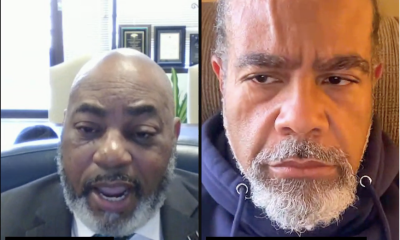Business
California Warns Businesses, Landlords Using Felonies and COVID-19 to Discriminate
So far, the state has sent more than 500 notices to businesses informing them that they have violated protections put in place to protect people seeking work.

The California state government has been reminding businesses across the state that it is illegal to discriminate against job applicants because of they have committed felonies or misdemeanors in the past.
Authorities in Sacramento have also taken steps to make sure businesses do not use COVID-related restrictions to deny entry to customers they do not want based on race or other factors.
So far, the state has sent more than 500 notices to businesses informing them that they have violated protections put in place to protect people seeking work.
“The California Department of Fair Employment and Housing (DFEH) announced a new effort to identify and correct violations of the Fair Chance Act, a pioneering state law that seeks to reduce barriers to employment for individuals with criminal histories,” a statement the DFEH released last week reads.
The Fair Chance act, which took effect on Jan. 1, 2018, was written to increase access to employment for Californians with criminal histories in an effort to reduce recidivism, among other goals. Employers with five or more employees are prohibited from asking a job candidate about conviction history during the hiring process or when advertising a vacancy.
The DFEH says it is implementing new technologies to conduct mass searches of online job applications that include unlawful statements. For example, some businesses explicitly state in hiring advertisements that they would not consider applicants with criminal records.
“Using technology to proactively find violations of the state’s anti-discrimination laws is a powerful strategy for our department to protect Californians’ civil rights,” said DFEH Director Kevin Kish. “DFEH is committed to preventing employment discrimination through innovative enforcement actions and by providing clear guidance to employers.”
DFEH also released a toolkit to aid employers in adhering to the Fair Chance Act guidelines. The toolkit includes sample forms and guides that employers can use to follow required procedures; a suggested statement that employers can add to job advertisements and applications to let applicants know that they will consider individuals with criminal histories; answers to frequently asked questions (FAQs) about the Fair Chance Act and an informational video that explains the Fair Chance Act.
In addition, DFEH plans to release an interactive training and an online app in 2022.
The DFEH also released guidelines for businesses that will be implementing COVID-19 related entry restrictions to protect against discrimination based on race, sex, religious background and nationality.
While businesses have been encouraged to stay vigilant with mask mandates and vaccination verification for entry, the DFEH says it has also found it necessary to preemptively address refusal of entry that could be racially motivated masked as a COVID precaution.
“As Californians navigate the COVID-19 pandemic, the Department of Fair Employment and Housing has provided guidance to protect civil rights and mitigate risk of COVID-19 transmission in employment, housing, healthcare, and, in our guidance released today, businesses open to the public,” said Kish. “We can and must uphold civil rights while simultaneously disrupting the spread of COVID-19.”
DFEH encourages individuals to report job advertisements in violation of the Fair Chance Act or other instances of discrimination.
DFEH is also encouraging the public to report housing ads that include discriminatory language that exclude certain racial groups, immigrants, people with felonies, applicants with Section 8 or HUD vouchers; etc.
Visit the DFEH website to file complaints.
Alameda County
Seth Curry Makes Impressive Debut with the Golden State Warriors
Seth looked comfortable in his new uniform, seamlessly fitting into the Warriors’ offensive and defensive system. He finished the night with an impressive 14 points, becoming one of the team’s top scorers for the game. Seth’s points came in a variety of ways – floaters, spot-up three-pointers, mid-range jumpers, and a handful of aggressive drives that kept the Oklahoma City Thunder defense on its heels.

By Y’Anad Burrell
Tuesday night was anything but ordinary for fans in San Francisco as Seth Curry made his highly anticipated debut as a new member of the Golden State Warriors. Seth didn’t disappoint, delivering a performance that not only showcased his scoring ability but also demonstrated his added value to the team.
At 35, the 12-year NBA veteran on Monday signed a contract to play with the Warriors for the rest of the season.
Seth looked comfortable in his new uniform, seamlessly fitting into the Warriors’ offensive and defensive system. He finished the night with an impressive 14 points, becoming one of the team’s top scorers for the game. Seth’s points came in a variety of ways – floaters, spot-up three-pointers, mid-range jumpers, and a handful of aggressive drives that kept the Oklahoma City Thunder defense on its heels.
One of the most memorable moments of the evening came before Seth even scored his first points. As he checked into the game, the Chase Center erupted into applause, with fans rising to their feet to give the newest Warrior a standing ovation.
The crowd’s reaction was a testament not only to Seth’s reputation as a sharpshooter but also to the excitement he brings to the Warriors. It was clear that fans quickly embraced Seth as one of their own, eager to see what he could bring to the team’s championship aspirations.
Warriors’ superstar Steph Curry – Seth’s brother – did not play due to an injury. One could only imagine what it would be like if the Curry brothers were on the court together. Magic in the making.
Seth’s debut proved to be a turning point for the Warriors. Not only did he contribute on the scoreboard, but he also brought a sense of confidence and composure to the floor.
While their loss last night, OKC 124 – GSW 112, Seth’s impact was a game-changer and there’s more yet to come. Beyond statistics, it was clear that Seth’s presence elevated the team’s performance, giving the Warriors a new force as they look to make a deep playoff run.
Activism
Oakland Post: Week of November 26 – December 2, 2025
The printed Weekly Edition of the Oakland Post: Week of November 26 – December 2, 2025

To enlarge your view of this issue, use the slider, magnifying glass icon or full page icon in the lower right corner of the browser window.
Activism
Oakland Post: Week of November 19 – 25, 2025
The printed Weekly Edition of the Oakland Post: Week of November 19 – 25, 2025

To enlarge your view of this issue, use the slider, magnifying glass icon or full page icon in the lower right corner of the browser window.
-

 Activism3 weeks ago
Activism3 weeks agoOakland Post: Week of November 12 – 18, 2025
-

 Activism4 weeks ago
Activism4 weeks agoOakland Post: Week of November 5 – 11, 2025
-

 Activism2 weeks ago
Activism2 weeks agoIN MEMORIAM: William ‘Bill’ Patterson, 94
-

 Activism3 weeks ago
Activism3 weeks agoHow Charles R. Drew University Navigated More Than $20 Million in Fed Cuts – Still Prioritizing Students and Community Health
-

 #NNPA BlackPress3 weeks ago
#NNPA BlackPress3 weeks agoThe Perfumed Hand of Hypocrisy: Trump Hosted Former Terror Suspect While America Condemns a Muslim Mayor
-

 #NNPA BlackPress3 weeks ago
#NNPA BlackPress3 weeks agoProtecting Pedophiles: The GOP’s Warped Crusade Against Its Own Lies
-

 Bay Area3 weeks ago
Bay Area3 weeks agoNo Justice in the Justice System
-

 #NNPA BlackPress4 weeks ago
#NNPA BlackPress4 weeks ago2026 Subaru Forester Wilderness Review: Everyday SUV With Extra Confidence

























































